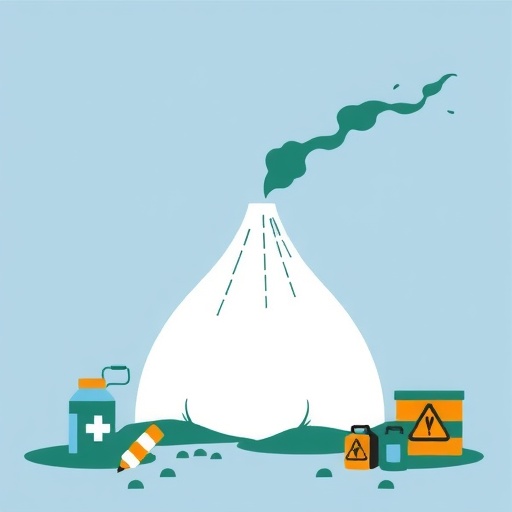The global landscape of hazardous waste management has emerged as a critical focal point in environmental science, as increasing levels of waste have created serious health and ecological challenges. A recent review article in Environmental Monitoring and Assessment provides an exhaustive analysis of the implications of hazardous waste and the effectiveness of various management strategies. The researchers—Desta, Sitotie, and Gebremedhine—highlight not only the types of hazardous materials but also the dire consequences these substances impose on human health and the environment.
One of the primary concerns discussed in the review is the adverse impacts of hazardous waste exposure. Various studies have established a direct correlation between hazardous waste and an uptick in diseases, particularly in communities located near waste disposal sites. These communities often experience elevated rates of respiratory illnesses, skin diseases, and even reproductive problems. The authors emphasize the need for immediate action to mitigate these health risks, suggesting that public health campaigns should be launched to educate affected populations on the dangers of hazardous waste exposure.
Moreover, the review meticulously examines the environmental ramifications of hazardous waste mismanagement. Soil and water contamination are highlighted as significant issues, with many toxic substances seeping into groundwater supplies. Such contamination not only threatens local ecosystems but also poses broader risks to agricultural productivity and food safety. The authors argue that sustainable practices must be woven into all levels of waste management to protect vulnerable ecosystems from degradation.
The review also provides an overview of various management strategies currently employed around the globe, such as incineration, landfilling, and recycling. Each method has its own set of challenges and benefits. Incineration is lauded for reducing waste volume but criticized for emitting harmful pollutants. On the other hand, landfilling is often the more economical option, yet it carries significant long-term environmental risks, including leachate production. The authors call for a nuanced understanding of these strategies, stressing that no single method can serve as a catch-all solution.
In discussing best practices, the review highlights the importance of legislative frameworks that govern hazardous waste management. Countries with stringent regulations tend to implement more effective waste management practices, resulting in lower rates of pollution and better public health outcomes. The authors advocate for global cooperation to share best practices and knowledge among nations, arguing that a collective approach is necessary to combat the complex challenges posed by hazardous waste.
The researchers also discuss emerging technologies in hazardous waste treatment, such as bioremediation and advanced oxidation processes. These innovative approaches show promise for minimizing environmental risks. Bioremediation, for instance, harnesses natural processes to degrade contaminants in soil and water. The review urges further investment in research and development of these technologies to enhance their applicability and efficacy in managing hazardous waste.
Another critical aspect addressed in the review is community involvement in hazardous waste management initiatives. Engaging local communities in monitoring and decision-making processes can lead to improved outcomes. The authors point out that community-led initiatives often result in greater awareness and more localized solutions to hazardous waste issues. This participatory approach not only empowers communities but also fosters a sense of ownership in the management of local environmental resources.
Furthermore, the implications of climate change on hazardous waste management are examined. With global temperatures rising, the review underscores the need to adapt waste management strategies to account for increased flooding, extreme weather events, and shifting ecological dynamics. The authors argue that current management practices must evolve to embrace climate resilience, ensuring that hazardous waste disposal does not compromise the integrity of the environment in a changing climate.
Policy recommendations are another focal point of the review. The authors propose a multi-tiered approach that aligns local, national, and international policies to achieve coherent and effective waste management frameworks. Establishing clear guidelines and incentives for sustainable practices can drive innovation and compliance among businesses and municipalities grappling with hazardous waste issues.
The review culminates in a call for heightened awareness and proactive measures to tackle hazardous waste management. By synthesizing data and findings from a range of studies, the authors aim to galvanize action among stakeholders, including government agencies, NGOs, and local communities. The interconnectedness of human health and environmental integrity emphasizes the urgency of developing comprehensive management strategies tailored to the unique challenges posed by hazardous waste.
In conclusion, the review serves as a timely reminder of the complex and pressing challenges associated with hazardous waste management. As waste generation continues to rise due to urbanization and industrialization, understanding the health and environmental implications becomes paramount. The authors provide a roadmap for mitigating these challenges through innovative strategies, robust policies, and community engagement, illustrating that effective waste management is not only an environmental imperative but a moral obligation to future generations.
The continuing dialogue regarding hazardous waste underscores the need for sustained research, informed policy-making, and the development of practical interventions. As the world grapples with changing environmental conditions and increasing waste, the findings from this comprehensive review provide crucial insights that can inform action across a multitude of sectors, fostering a healthier planet for all.
Subject of Research: Impacts of hazardous waste and management strategies
Article Title: Impacts of hazardous waste and management strategies: a review
Article References:
Desta, G.A., Sitotie, Y.M., Gebremedhine, M.G. et al. Impacts of hazardous waste and management strategies: a review.
Environ Monit Assess 197, 1173 (2025). https://doi.org/10.1007/s10661-025-14634-x
Image Credits: AI Generated
DOI: https://doi.org/10.1007/s10661-025-14634-x
Keywords: Hazardous waste, management strategies, environmental impact, health risks, bioremediation, community involvement, climate change, policy recommendations.




